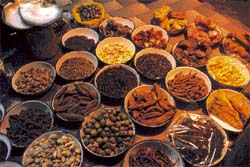Trading in contraband
 While tiger parts, ivory and sandalwood smuggling continue to attract all the public attention, what India is losing is its medicinal wealth to well-organised smuggling networks run by thousands of Veerappans all across the country. Mum's the word on the trade practices, while forests, whether in the north, south, east or west are stripped off their treasure. One can collect any quantity of these plants from the forests and pay the least to the primary collectors who have no way out of the trader's grip. Government policies that seem to have a blind eye for domestic trade have only made things easier for the smugglers. The situation does not differ in different parts of the country, only minor specifics do. Overexploitation and unscientific harvesting of medicinal plants have led to the virtual decimation of several valuable species in the wild. Habitat degradation, illegal trade and loss of regeneration potential of degraded forests have further accelerated the rate of extinction. This has critically affected traditional Indian systems of medicine (ISM) such as ayurveda , siddha and Unani , which rely on medicinal plants. The only way to arrest further loss of medicinal plant species and ensure survival of these centuries-old practices of healing would be to encourage sustainable harvesting of plants from the wild and cultivation, especially by small farmers and communities who have been involved in herb gathering traditionally. Leena Chakrabarti travels to forests of Uttaranchal and back alleys of the herbal markets in Tamil Nadu and West Bengal, while Vibha Varshney finds out effects of illegal trade on ism and why cultivation of these valuable plants is still not a business
While tiger parts, ivory and sandalwood smuggling continue to attract all the public attention, what India is losing is its medicinal wealth to well-organised smuggling networks run by thousands of Veerappans all across the country. Mum's the word on the trade practices, while forests, whether in the north, south, east or west are stripped off their treasure. One can collect any quantity of these plants from the forests and pay the least to the primary collectors who have no way out of the trader's grip. Government policies that seem to have a blind eye for domestic trade have only made things easier for the smugglers. The situation does not differ in different parts of the country, only minor specifics do. Overexploitation and unscientific harvesting of medicinal plants have led to the virtual decimation of several valuable species in the wild. Habitat degradation, illegal trade and loss of regeneration potential of degraded forests have further accelerated the rate of extinction. This has critically affected traditional Indian systems of medicine (ISM) such as ayurveda , siddha and Unani , which rely on medicinal plants. The only way to arrest further loss of medicinal plant species and ensure survival of these centuries-old practices of healing would be to encourage sustainable harvesting of plants from the wild and cultivation, especially by small farmers and communities who have been involved in herb gathering traditionally. Leena Chakrabarti travels to forests of Uttaranchal and back alleys of the herbal markets in Tamil Nadu and West Bengal, while Vibha Varshney finds out effects of illegal trade on ism and why cultivation of these valuable plants is still not a business
